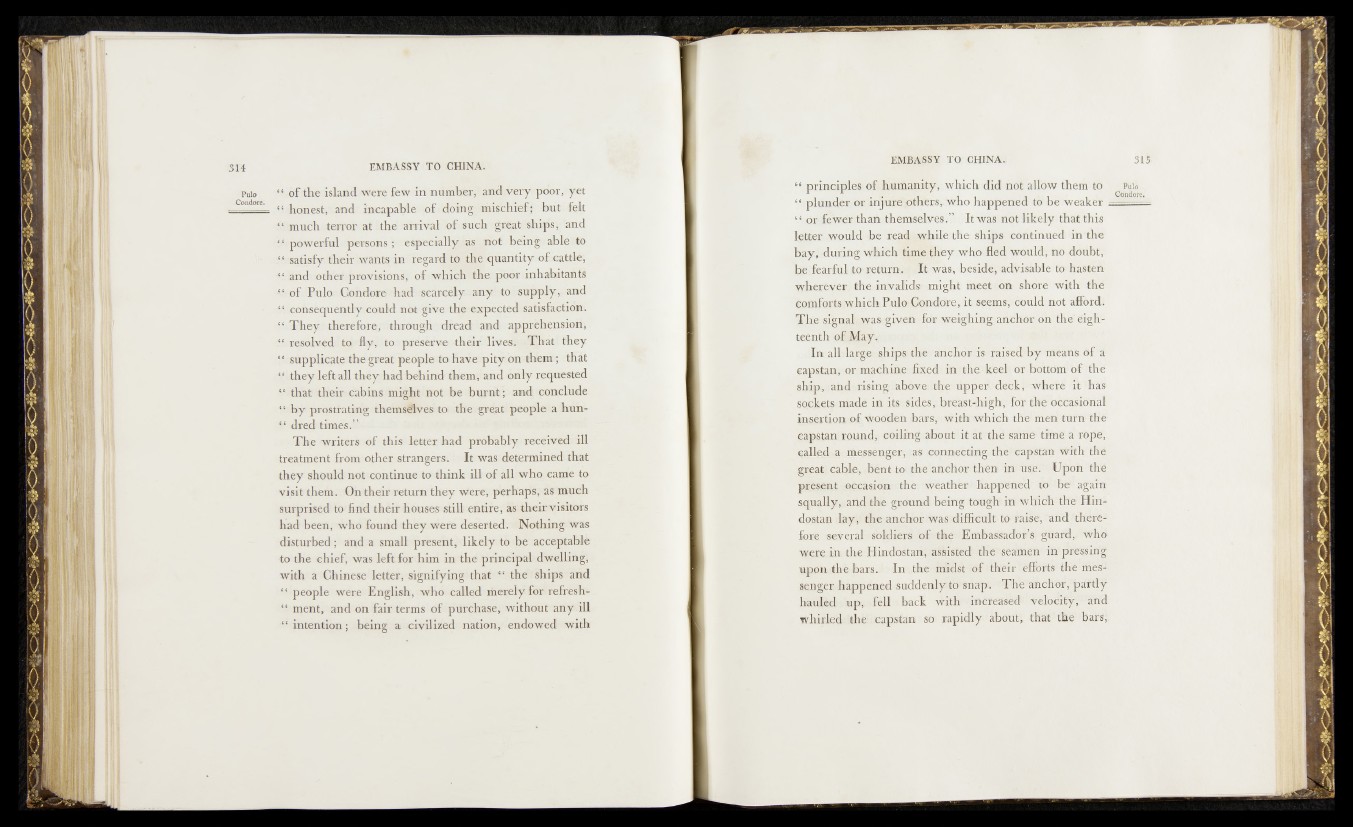
Pulo
Condors.
‘ ‘ of the islandwere few in number, and vmy{pdQir,?yet
11 honest, > and incapable o f tdoing mischief j but. feit
“ much terror at the arrival ofsuch grèafc «ships ,4and
“ powerful persons ; especially as-, nod bei$i|jfe able to
“ satisfy’ fcbefcwants in «regard to the quantity ofieatfclè,
- ‘ and otfeeiïipmvisionéj of which the poof inhabitants
-‘-‘-of Pula1 Oandeare hadr-^eareelyi- anyito supply, and
“ consequently- could not givedhe espepted-satisfectidn.
“ They1 therefore, through dread andfapprehensioih
“ resolved to fty^ to preserve-their ltve^^Tbat ' they
“ supplicate the greart people to have pity on them; that
theydeftall théy had behind them, and only requested
“ that thèfeeabins might not be burnt; and! conclude
“ by prostrating themsüves to the great peeple a kun-
“ dred times.”
The writers o f this letter had probably i»eeiv®dbii
treatment from other strangers.; It was determined that
they should not continue to think ill of all wbqoganfe to
visit them. Cintheir return they Were, perhajis^as much
surprised to find their houses still entire, as their: visitors
had been,wbö found they were darted;. Nothing Was
disturbed ; and a small present, likely to be acceptable
iff the chief, was lefefer him in thé principal dWeMingf
with a Chinese letter, signifying that “ thé ships and
“ people were Er^ish, who called merely fotf refeesh-
“ ment; and on fair terms of purchase, without any ill
“ intention ; being a civilized nation, endowed with
« H I TG^'iC-BINA;*1. SIS
“ principles« of humanity, which did not allow them to tuia r " - a 1 ^ y. _ - | r _. . , , Candor« “ pluuderi brjiiujurepidfbrs r?Who happened tèbë weaker
y QE^fewéE'febap. themselves.” It was not likely that this
letter ^wpuldrïbe ieadsImhileitHe; ships continued^ih the
b^.ylidujfi'U’gj which timé they tyfafo1 fled: would, no doubt,’
beifearful to return^ Tfrw&s, fojeskfè, advisablesto hasten
whesevepj thejinvalidsr^Ettight meet on sl|be ■ with thé
epmforhbwhicb PulojCondcke,. it seems^buld not afforcL
The $ignal?|was?giv!edi for weighing-anchor oü thé ëigh-
tèl'iÉh. joi-Sa-y* |
In.alhlaEgec ships} tkeoahëfior is'fais’ëaïby 'KfeSriS èf'-a
êipsÉan, ér machine fixed'« in thedkfeeb or lbéttÖ01;bf’!th'é
sMyifj.iand rising i‘above the upper deck; where it has
socketymadé in, i|Sï sides;: brelfct "-high, for thé* bcéWdötial
insertion o f wooden bars, with Which thelmeW tUrn the
capstan round, coiling about it if*the Sortie’ time a rope',
■ s%lhd5a'rBfiesse®gerv4as connecting, thette&pstM with thd.
g^egt, cable, <bént tmtbslalbekor-then in tt§@? Upon thé
present ^l.cision nthei'^lather^ happened' W^B0 a'gaM-
squally, arid the ground: being tough in' wMcnPthe Hindustan
flay, the anchor twas*d>Mfioult to-raise,' an'd'^tftef'ë'2
fprê several^sbldiers of the Embas&adtaTs, gtfardyWhd
were in the-Hinictótan, assisted? thé-’sëalrhén' iWJpi-‘ê’#itff;
upon the bars. In „the ‘ibid at »of dheir ï efforts ihe«r$bP
senger, happened jsaddenly tb' snap. * 'Miéh'ér^a'f tiy
hauled up,, fell i back with 'ine#e'^ëd; Velbéity^MhU
whirled the capstan s0s rapidly ;about; that’tie